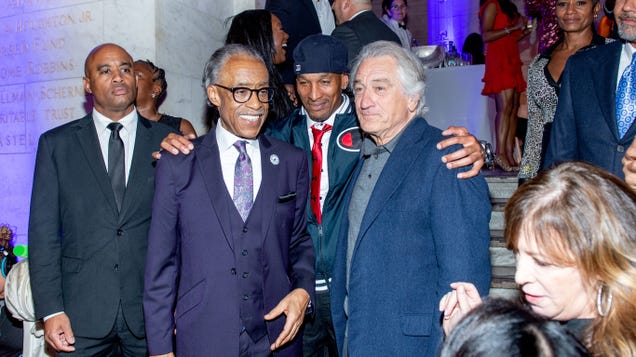
Libras are extra.
from The Root https://ift.tt/2AEvYKW
Lizzo opened up about how mean-spirited, body shaming comments helped shape the singer and actress into a star who knows her self-worth in the skin she’s in.
—Lizzo wants us to stop calling her ‘brave’ for loving her body—
In a CBS Sunday Morning clip of an interview set to air October 6, the hit-making singer got real about her life, her father’s death and her thoughts on digs about her weight.
The star, whose real name is Melissa Jefferson, said the moment she started to believe in her own body positivity is when the tide changed for her.
“Like, when I’m looking at my body and I’m shaming every little thing about it, I have to look at all of those things that I’m shaming, and I have to find love in those things. And I think that is why I’m able to call myself fat,” Lizzo said.
“I can also feel healthy and still be fat,” she added. “I can be healthy and be fat. I can be beautiful and be fat. I can be beautiful and all of those things. And I think it’s because I learned to actually look all of my insecurities in the face, call them by their name, and fall in love with them.”
The ‘Truth Hurts’ singer shared that sentiment earlier this year when he told Glamour Magazine that she has never been ashamed of her plus-size or confident look but she’s getting sick of how people give backhanded compliments about the way she flaunts what her mama gave her.
“When people look at my body and be like, ‘Oh my God, she’s so brave,’ it’s like, ‘No I’m not,’” Lizzo, 31, explains. “I’m just fine. I’m just me. I’m just sexy. If you saw Anne Hathaway in a bikini on a billboard, you wouldn’t call her brave. I just think there’s a double standard when it comes to women.”
— Lizzo’s 2-year-old song ‘Truth Hurts’ might still qualify at 2020 Grammys—
Lizzo’s “fat” is certainly not holding her back. She’s staring in major makeup campaigns and dressing in ways that celebrate her figure will help normalize bodies like hers. Currently, she’s a spokesperson for Absolut Vodka’s new “Juice” line a nod to her career making hit of the same name. And she recently starred in J Lo’s “Hustlers” movie.
The post Lizzo: How mean-spirited shamers taught her body positivity appeared first on theGrio.
The beauty of a franchise system is that much of the risk that comes with starting up a business is mitigated, which increases your chances for success—if you follow the model. But like anything else, there are certain qualities, characteristics, and experiences of the franchise owner that can help propel you to top performing status.
With the average initial investment for a franchise being $250,000, having the confidence that you posses the skills to run a successful franchise may help you get past your fears and take the next steps toward entrepreneurship. Of course, success can be measured in a number of ways, but as a benchmark, I advise clients that for every $100,000 of capital they invest, they should anticipate making at least $15,000 per year in ROI. Most franchises, particularly in the service industry where overhead costs are lower, yield between 20%-25%, after calculating for both the active and passive investment costs.
Franchises are attractive to corporate professionals because they provide the autonomy professionals seek from an independent business and the systems they appreciate from corporate life. Certain professional experience can also lend itself to achieving that ROI goal quicker and in many cases, top performing status, regardless of industry or sector experience.
You shouldn’t give up on your dream of franchise ownership if your profession is not on the list. If you have read any number of my articles in Black Enterprise where I interview franchise owners, then you know that teachers, dancers, athletes, and police officers have been wildly successful in franchising. However, for professionals with one or more of these skill sets in their background, the career transition and speed to success can be that much easier.
The beauty of a franchise system is that much of the risk that comes with starting up a business is mitigated, which increases your chances for success—if you follow the model. But like anything else, there are certain qualities, characteristics, and experiences of the franchise owner that can help propel you to top performing status.
With the average initial investment for a franchise being $250,000, having the confidence that you posses the skills to run a successful franchise may help you get past your fears and take the next steps toward entrepreneurship. Of course, success can be measured in a number of ways, but as a benchmark, I advise clients that for every $100,000 of capital they invest, they should anticipate making at least $15,000 per year in ROI. Most franchises, particularly in the service industry where overhead costs are lower, yield between 20%-25%, after calculating for both the active and passive investment costs.
Franchises are attractive to corporate professionals because they provide the autonomy professionals seek from an independent business and the systems they appreciate from corporate life. Certain professional experience can also lend itself to achieving that ROI goal quicker and in many cases, top performing status, regardless of industry or sector experience.
You shouldn’t give up on your dream of franchise ownership if your profession is not on the list. If you have read any number of my articles in Black Enterprise where I interview franchise owners, then you know that teachers, dancers, athletes, and police officers have been wildly successful in franchising. However, for professionals with one or more of these skill sets in their background, the career transition and speed to success can be that much easier.

An Apple Watch Series 4, an ultra-low price on ExOfficio Boxer Briefs, and a grill that is apartment-sized lead off Friday’s deals.
In the rich tapestry of history, the threads of Black LGBTQ+ narratives have often been overlooked. This journey into their stories is an ...